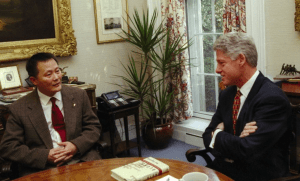Journal of Political Risk, Vol. 7, No. 7, July 2018

Dump trucks operate in an open pit at the Oyu Tolgoi copper-gold mine, jointly owned by Rio Tinto Group’s Turquoise Hill Resources Ltd. unit and state-owned Erdenes Oyu Tolgoi LLC, in Khanbogd, the South Gobi desert, Mongolia. Mongolia exported 817,000 tons of copper concentrate in the first half of the year compared with 663,800 tons a year earlier, an increase of 23.1 percent. Source: Flickr.
Indra Tsatsral
Oxford Brooks University
The year is 2008 and Ulaanbaatar, the capital city of Mongolia, still resembles a gritty Soviet satellite state with its deteriorating apartment blocks and a statue of Lenin standing bold. Fast-forward a mere four years later and the apartment blocks have deteriorated further while a dazzling 25-story hotel overlooks the shadow of the recently removed statue. Today, with a plethora of Western companies ranging from luxury brands such as Rolex to the familiar Pizza Hut sprouting all over the city, you will be forgiven for mistaking Ulaanbaatar as one of the Four Asian Tigers. Unlike the Four Asian Tigers, which flourished predominately through industrialisation, however, Mongolia’s rapid ‘development’ is mainly attributed to the country’s colossal mineral wealth.


